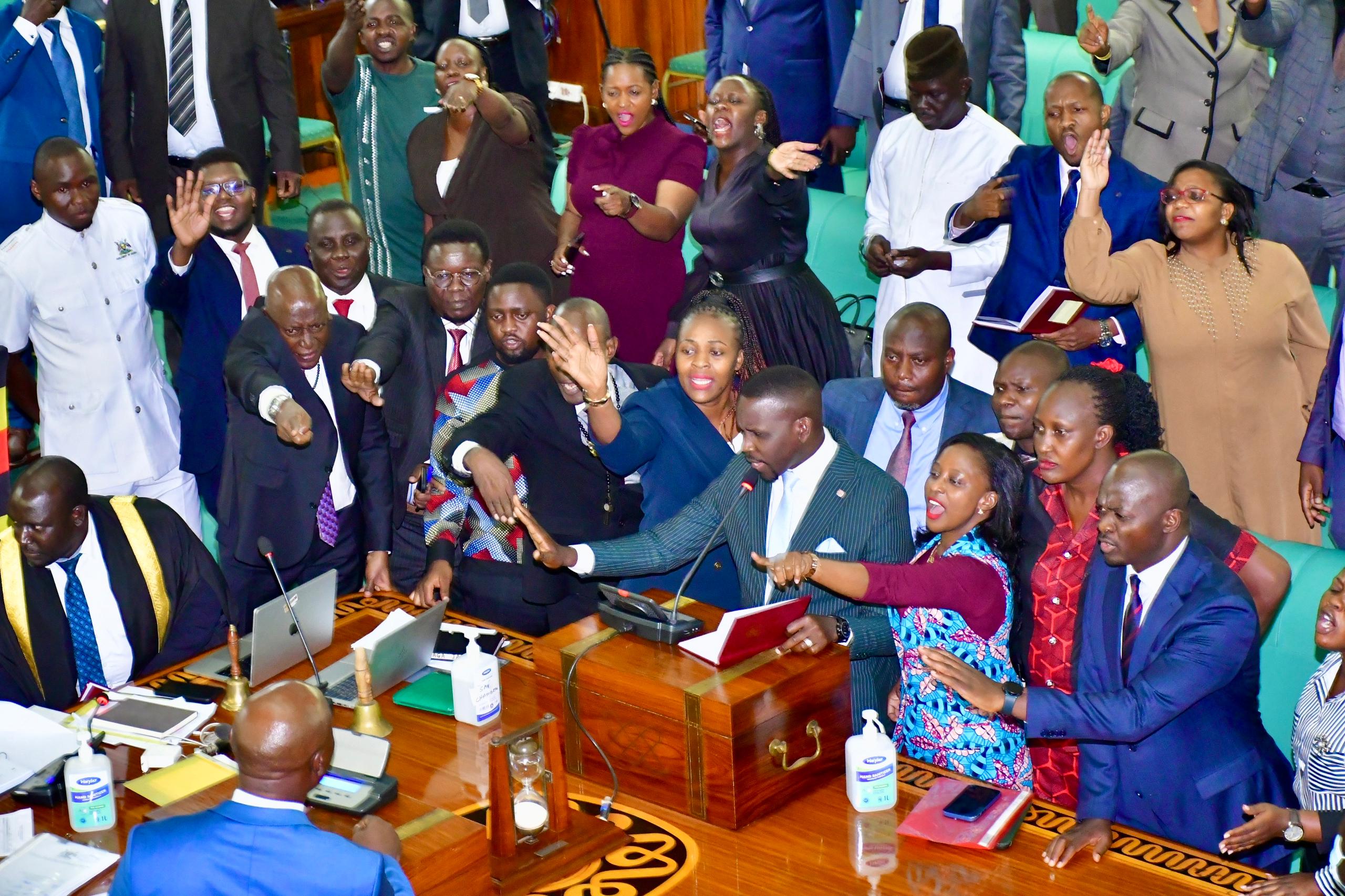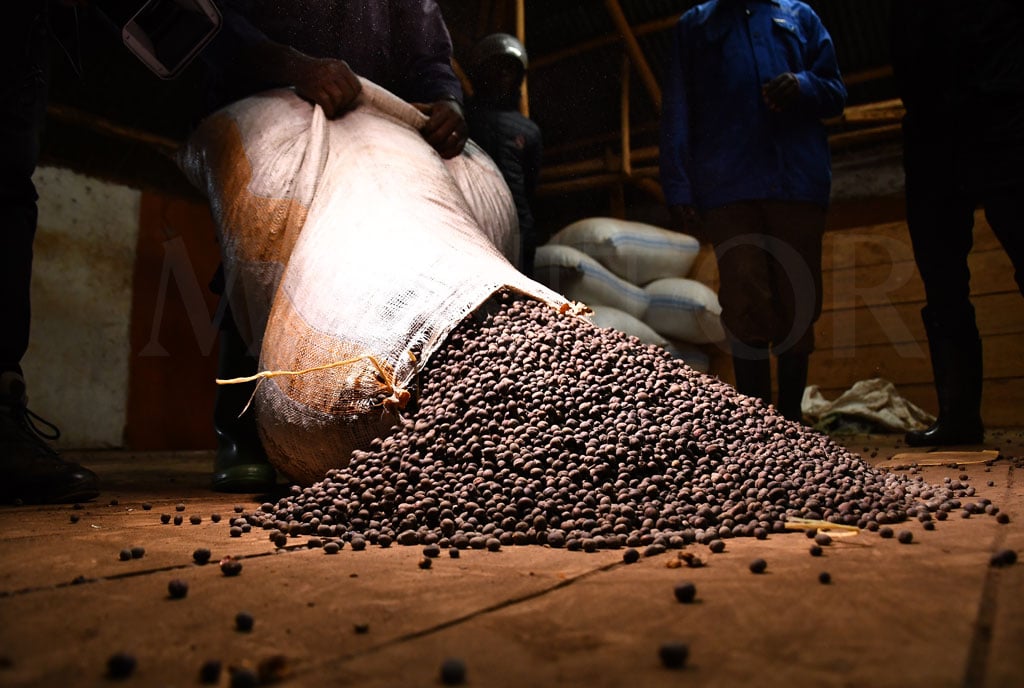
Opposition Members of Parliament led by the Leader of Opposition (LOP), Joel Ssenyonyi put the Speaker, Ms Anita Among, on task during the plenary session at Parliament on October 24, 2024. PHOTO/DAVID LUBOWA
Today, the National Resistance Movement (NRM) Parliamentary Caucus members flock President Museveni’s farm in Kisozi, Gomba District for a closed-door meeting, which insiders say is planned to hash out a “razor-sharp strategy” targeting those against the Coffee Bill, in a battle for rationalisation of Uganda Coffee Development Authority (UCDA).
On October 24, after the dramatic scenes in Parliament chaired by Speaker Anita Among, 159 MPs voted to proceed with the Second Reading of the Coffee Bill and 77 MPs voted against the government proposal to abolish UCDA and transfer all its functions to the Ministry of Agriculture.
Coffee farmers took to social media platforms, poking holes in the new Bill and simultaneously urging their representatives in Parliament to safeguard UCDA against rationalisation. A group of legislators from Central region and their counterparts from other coffee growing areas, have vowed to take the battle to the floor of Parliament and pleaded with the ruling party majority to wake up and smell the coffee.
The Katikkiro of Buganda, Mr Charles Peter Mayiga, rejected plans to abolish UCDA and asked the government to save the coffee authority from rationalisation and instead inject more funds to empower farmers and other stakeholders to boost coffee production in the country.
According to UCDA managing director, Uganda’s coffee sub-sector has achieved remarkable growth, culminating in record-breaking achievements for the Financial Year 2023/24. Coffee exports earned an unprecedented $1.14 billion (about Shs4.1 trillion), marking an increase of 6.33 percent in value compared to the previous financial year—the highest revenue in 30 years.
Uganda exported 6.13 million bags of coffee, an impressive rise from the 5.8 million bags in FY2022/23, which brought in $846 million (about Shs3 trillion) for Uganda.
In June 2024 alone, Uganda exported 667,037kg of coffee valued at $162.36 million (about Shs591.1 billion), significantly contributing to the annual total and proving that the $1.5 billion (about Shs5.4 trillion) by 2030 target of the Coffee Roadmap is achievable.

Mathias Mpuuga
Parliament is expected to reconvene after November 12 to consider the Bill clause by clause under the committee stage. The Bill has polarised the country, made headlines and appears to have distressed 1.8 million coffee growing households.
Some of the coffee growers Daily Monitor interviewed and MPs against the Bill, are concerned that any attempts to hound UCDA into Agriculture ministry, might affluence Italian investor Enrica Pinneti and her Vinci Coffee Company Limited to meander back into the coffee business in Uganda and lock out potential investors in the coffee sector; compromise quality and marketability of Uganda coffee.
The Pinetti deal
Two years ago, Finance minister Matia Kasaija signed an agreement with Ms Pinetti to construct an $80 million (about Shs291.2 billion) coffee processing factory in Uganda processing 60,000 tonnes of coffee annually. The Pinetti coffee deal drew a storm in coffee cup after farmers and business people involved in the coffee value chain rejected plans to monopolise coffee exports and dismissed the deal as bad news. Parliament would later pass a bipartisan resolution, advising the government to withdraw from a deal the President and other government officials had for months touted as a panacea to the country’s coffee value addition challenges.
Inside the Coffee Bill
The Coffee Bill has 58 clauses. Clause 2 of the draft Bill before Parliament provides for the objectives of the proposed legislation and clause 3 of the draft coffee legislation provides for the purpose of amending the National Coffee Act,2021, which is to mainstream the functions of the coffee Development Authority into the ministry responsible for agriculture.
There are only three controversial clauses (4,5 and 58) in the 14-page Bill that was presented to Parliament and read for the first time on September 24, and subsequently referred to the Committee on Agriculture, Animal Industry and Fisheries for scrutiny.
The controversial clauses have flipped the House, brought the fortunes of coffee farmers to the fore and inflamed political sentiments on account of mistrust and suspicion.
Clause 4 of the Bill proposes to abolish the UCDA and transfer the functions of the coffee Development Authority to the Ministry responsible for agriculture. This according to the document is intended to give effect to the Government Policy on Rationalisation of Government Agencies and Public Expenditure (RAPEX), and for related purposes.
Clause 5 provides the grace period (of three years) for the dissolution of UCDA established by Act 17 of 2021 and empowers Agriculture ministry to regulate, promote and oversee the coffee subsector; regulate all on-farm and off-farm activities in the coffee value chain. The clause also provides for a coffee auction system; and other related matters.
Clause 58 (1) provides that all pending applications for any kind of registration under the proposed Act shall be continued under the Ministry of Agriculture and sub-clause (5), vests all the property, assets, rights, obligations, and liabilities of the UCDA in the Government of Uganda under the Ministry of Agriculture.
Clause 58 (7) clarifies that all existing licenses, permit, certificate or authorisation issued by the c UCDA under the principal law, which is in force immediately before the commencement of the new law, shall have effect from the commencement of the amended Coffee Act as if granted by the Agriculture minister.
The rest of the clauses in the Coffee Bill are consequential amendments resulting from the abolition of the UCDA and the transfer of its functions to the ministry responsible for Agriculture.

MPs during plenary on October 24, 2024
Defects in the existing law
The policy behind the Coffee Bill is to give effect to the government policy for RAPEX, which was adopted by the Cabinet on February 22, 2021. The proposed amendments target agencies that were established without due consideration to the aspects of institutional harmony, functional duplications, overlaps and affordability.
The Constitution establishes a definite number of government agencies, including constitutional commissions, authorities, boards, local councils and other statutory bodies. These were established to perform certain specified constitutional functions. Over the years, however, the government has realised that some are no longer necessary on account of what the minister called “proliferation” of agencies established by acts of Parliament, Executive orders and administrative arrangements.
The government has also established that some agencies have served the purpose for which they were established. Therefore, the mandate of a few other agencies has been overtaken by events. The proliferation of agencies according to Agriculture Minister Frank Tumwebaze had created “mandate overlaps” and jurisdictional ambiguities among the agencies.
Paradox of plenty
For UCDA, insider sources talked of “paradox of plenty” attributed to abundant resources from the current coffee boom. The board and management were earning fat salaries and allowances, which government blamed on uncontrolled high cost of administering the Authority. In the draft bill, Mr Tumwebaze confirms that some agencies the president vilified as “parasitic” had “drained the national treasury at the expense of effective service delivery and overstretched the capacity of government to sustain them.”

Frank Tumwebaze
Digging into the fat pay, the government explained that they had established that the generous salary structures of some agencies had created salary disparities between employees of the agencies and public officers in the traditional civil service leading to demotivation of human resources in the mainstream public service.
The Cabinet decision to abolish UCDA according to Mr Tumwebaze seeks to address wasteful expenditure and ensure efficient and effective services delivery. The minister also talked of politics at play, renounced plot to hijack coffee, kill it and create a monopoly that benefits the few well-connected individuals in government.
In an interview with Daily Monitor, Mr Tumwebaze accused those against the bill of dishonesty and reiterated that The National Coffee (Amendment) Bill, 2024, is among several other Bills for rationalisation of agencies and reducing public expenditure that remains a dent in government efforts to streamline service delivery.
“The exercise of rationalisation is not about UCDA alone. It's a re-organisation of the entire government structure of service delivery. Rationalisation seeks to eliminate scattering of scarce resources across many government institutions doing the same work. It seeks to consolidate resources and efforts,” Mr Tumwebaze said.
Shadow Attorney General Wilfred Niwagaba accused the government of playing politics. “If government was genuine in rationalisation, it would cut down substantially those units that are consumptive in nature and which are largely in areas of administration- the political units… for coffee as one of our lifelines, it’s self-defeating to abolish UCDA which generated $ 1.25 billion between August 2023-July 2024.”
The Leader of the Opposition in Parliament, Joel Ssenyonyi, has promised to continue the fight to protect coffee when the House resumes.
“I urge our colleagues in the NRM to be on the right side of history by joining us to protect coffee farmers, whose livelihood is under threat,” he said.
Mr Ssenyonyi added: “We hope to hear more voices of cultural leaders, religious leaders, and the citizenry generally. The voice should be a resounding one, that government should leave coffee alone!”







